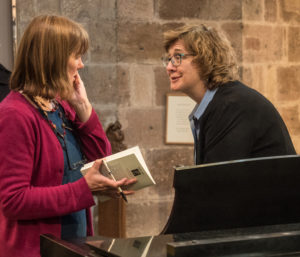Grown Wild (Melissa Dunphy, 2021)

Composer Melissa Dunphy specializes in political, vocal, and theatrical music. She first came to national attention when her large-scale work the Gonzales Cantata was featured in The Wall Street Journal, The Atlantic, National Review, Fox News, and on The Rachel Maddow Show, and was staged by American Opera Theater in a sold-out run. Other notable works include the song cycle “Tesla’s Pigeon,” which won first place in the NATS Art Song Composition Award, and choral work “What do you think I fought for at Omaha Beach?” which won the Simon Carrington Chamber Singers Competition and has been performed by ensembles including Chanticleer and Cantus. Dunphy is the recipient of a 2020 Opera America Discovery Grant for Alice Tierney, a new opera commission by Oberlin Conservatory set to premiere in 2023. She has been composer-in-residence for the Immaculata Symphony Orchestra, Volti, and the St. Louis Chamber Chorus. In addition to her concert and choral music, she is a Barrymore Award-nominated theater composer and sound designer and is Director of Music Composition for the O’Neill National Puppetry Conference. Dunphy has a Ph.D. in composition from the University of Pennsylvania and a B.M. from West Chester University.
Grown Wild is a short (five-minute) song for women’s voices, piano and violin. It is based on a poem by Melissa Apperson.
The Tree House (Beth Denisch, 2017)

A commission happens in stages: bubbling up with general thoughts, fine tuning ideas, discovering inspired text and finding a talented and willing composer/partner, all resulting in a specific artistic creation that is rehearsed and loved and birthed. For the text for this commission, we turned to the poetry of Kathleen Jamie, one of Scotland’s most lauded contemporary poets. Ms. Jamie has been described as writing musical poems that attend to the intersection of landscape, history, gender, and language. Her work reflects the mystical connection between the natural world and the landscape of the human soul.
I have known Beth Denisch for a number of years and have had the privilege to conduct her music in the past. As a composer, Beth is thoughtful, brilliant and sure in her approach. She is also a dedicated and inspiring teacher at Berklee College of Music. Here, for us, she has created a work of nuance, delicacy, ferocity and utter beauty.
The Tree House is structurally a three-movement work, based on three of Jamie’s poems from her 2004 volume, The Tree House. In “Landfall,” the poet is walking, being attentive, and becomes off balance, a ‘single ragged swallow / veering towards the earth.’ Poetry of the ear becomes poetry of inner-ear imbalance, tilting towards the larger question, ‘can we allow ourselves to fail’? “The Orchard” is one complete sentence, broken down into five unrhymed tercets. Jamie delineates a netherworld where nothing is quite what it seems. In “Alder,” she proposes a way of living that recognizes the earth as home to many different states of awareness and means of engagement. The poet asks, ‘won’t you teach me / a way to live / on this damp ambiguous earth?’
Beth Denisch magically renders these alchemical texts; they are perfectly paced, lovely, radiant, challenging, and measured.
In May 2017, the Concord Women’s Chorus premiered The Tree House in Concord, Massachusetts. The following month, the chorus performed The Tree House at St. Giles’ Cathedral in Edinburgh with both composer and poet in the audience.
— Jane Ring Frank
Concord Fragments (Libby Larsen, 2010)

Libby Larsen (b. 1950) is one of America’s most performed living composers. She has created a catalogue of over 500 works spanning virtually every genre from intimate vocal and chamber music to massive orchestral works and 18 operas. Grammy Award winning and widely recorded, including over 50 CDs of her work, she is constantly sought after for commissions and premieres by major artists, ensembles, and orchestras around the world, and has established a permanent place for her works in the concert repertory.
As a vigorous, articulate advocate for the music and musicians of our time, in 1973 Larsen co-founded the Minnesota Composers Forum , now the American Composer’s Forum, which has become an invaluable aid for composers in a transitional time for American arts. A former holder of the Papamarkou Chair at John W. Kluge Center of the Library of Congress and recipient of the Eugene McDermott Award in the Arts from the Massachusetts Institute of Technology as well as a Lifetime Achievement Award from the American Academy of Arts and Letters, Larsen has also held residencies with the California Institute of the Arts, the Arnold Schoenberg Institute, the Philadelphia School of the Arts, the Cincinnati Conservatory, the Minnesota Orchestra, the Charlotte Symphony and the Colorado Symphony.
Description and review: “Concord Women’s Chorus Celebrates 50 Years with Regional Women Composers, Poets”, The Boston Musical Intelligencer (May 15, 2010)

You must be logged in to post a comment.